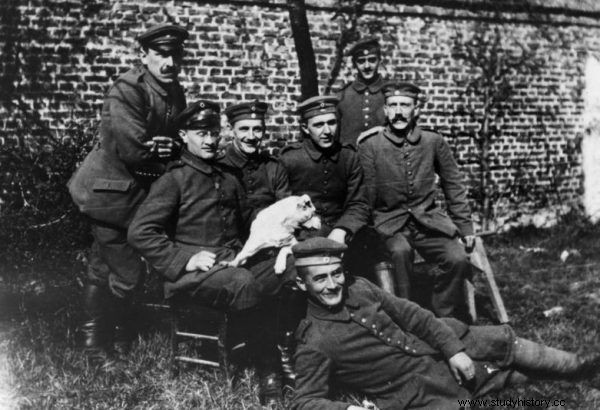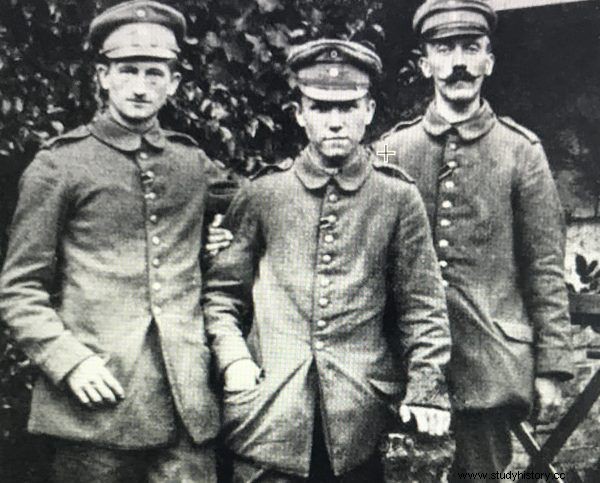He considered himself a German almost from birth. However, the law did not support him for a long time - he was born a subject of the Austro-Hungarian monarchy. And although he lived in his adopted country before World War I, he had to wait many years for citizenship. How did he get them in the end?
"Adolf Hitler has become a German citizen today" - this information on February 25, 1932 spread around the world like wildfire. Even the New York Times wrote about the case the next day. And no wonder:it was crucial for the presidential elections scheduled for March this year. If the naturalization of the head of the NSDAP was delayed or blocked, he would not be able to take part in this or any other race for state positions.
At this stage, Hitler had been in Germany for almost 20 years. He moved to his adopted homeland in 1913. So why didn't he arrange the necessary formalities earlier?
On the wrong side of the border
Braunau, the small town where the future Führer was born in 1889, has often changed hands in the past. At the end of the 19th century, however, it had belonged to Austria for several dozen years, so the son of the Hitler family was included among the subjects of Emperor Franz Joseph I.

Adolf Hitler was born in this house in the border town of Brunau, Austria.
This legal qualification had little to do with the facts. As writer and historian Bob Carruthers notes in the book "Hitler's Stormy Youth", the people of the region did not necessarily feel connected with Austria-Hungary:
Whatever the political frontier at one time or another, the area was predominantly German and the vast majority of the population spoke German and therefore had an obvious tendency to to consider itself part of the greater German Reich.
It was similar with the young Adolf, who from his earliest youth was soaked in the ideas of German nationalism. He later wrote about his hometown that it was "blood Bavarian, but under the rule of the Austrian state."
He certainly felt German - but deprived of proper citizenship. "I was forced, albeit with hidden envy, to accept the fact that not all Germans were fortunate enough to belong to the Bismarck Empire . It was something I couldn't understand, he later wrote in Mein Kampf. This attitude even led to a conflict with his loyal father to the Habsburgs, who did not like his son's slogans of the merger of Austria and Germany under the rule of William II.

In service in the Prussian army
Despite these openly manifested sympathies, Hitler was in no hurry to move to his "real" homeland. It was not until 1913 that he moved to Munich, where his political career began a few years later. In addition, although he later insisted that he went there "for political reasons," most likely ... he was running away from conscription. As Bob Carruthers explains:
Hitler was a subject of the Austro-Hungarian Empire and his yearbook was to be drafted into the army in 1913. The suspicion that he was evading conscription is even stronger if we take into account the previously mentioned passage from the book of his friend August Kubizek. Kubizek recalled that when he himself was drafted into service, Hitler urged him to flee to Germany, as it was the best way to avoid being drafted into the Austro-Hungarian army .
A year later, the Austrian immigrant proved his loyalty to the German emperor. While he was happy to accept the decision of the Austrian conscription commission about his incapacity for service, he volunteered for the army of Wilhelm II himself. "I didn't want to fight for the Habsburg cause, but at any moment I was ready to die for my countrymen and the Empire to which they really belonged," he later explained.
Hitler filed a petition for admission to the German army in early August 1914. The very next day he was ordered to report to the nearest barracks. He spent almost six years in the service and it seems that he considered it sufficient proof of his "Germanness". This argument was often used by his supporters, convincing - of course without legal consequences - that their leader naturalized ... in the war .

Hitler with his colleagues from the detachment after joining the Prussian army in 1914.
Stateless
Interestingly, representatives of the Austrian authorities, who in 1924 still remembered about Hitler's disloyalty, were of a similar opinion. Bavarian officials then considered - it was after the Munich coup - the deportation of a troubled immigrant.
In the spring of 1924, Austria confirmed that it was ready to receive him - but in the fall, when the case returned to the list, the border guards refused him admission. As one of the Fuhrer's biographers, Ian Kershaw, explains:
Directive [in this case - ed. A.W.] was sent personally by the Federal Chancellor Ignaz Seipel himself . In response, Bavaria's attempts to use legal arguments - compelling on their own - to pressure the Austrian government into accepting Hitler back did not work.
Seipel simply refused, insisting that Hitler's service in the German army resulted in the loss of Austrian citizenship . This was legally not a valid argument. But it was enough.

Hitler with two other soldiers in the Prussian army.
For his part, Hitler made sure that a similar threat would not arise again. In April 1925, he renounced his citizenship. In support of his application in this case, he again referred to service in the German army; He also added that he intended to apply for naturalization in Germany. "Removing any threat of deportation in the future cost him an impressive sum of 7.50 Austrian Schillings ”- comments Kershaw.
Contrary to what had been announced, the future leader of the Third Reich did not apply for German citizenship. He remained stateless for the next 7 years.
Smuggled Citizen
As time passed, the issue of Hitler's nationality became more and more pressing. From the end of the 1920s, close associates of the NSDAP leadership tried to get him shortcuts to vote, as quickly as possible and without unnecessary formalities.
First they planned to do it in Bavaria, but their efforts were thwarted. The concept of admitting him to the group of German citizens by fictitiously appointing him to the position of police sergeant in Thuringia in 1930 also failed.
Only the operation in Braunschweig was successful. There, the head of the Nazi party received a post of councilor in the Office of Agriculture and Geodesy, which granted him - as a state official - automatic citizenship. He received them on February 25, 1932, and the next day he swore allegiance to his new homeland.

What did the federal authorities think about such a raid? As the journalists of the New York Times commented on February 26:
The naturalization of the Nazi leader under political pressure will not face opposition from the Reich government, which has no intention of making a martyr on the eve of the elections despite the official dissatisfaction with his refusal to acquire citizenship on the normal route for foreigners.
The ceremony was therefore held with the knowledge and consent of the German government, which, however, did not welcome the new citizen with great enthusiasm. Interestingly, the interested person himself did not show joy either. He dismissed the congratulations flowing from everywhere with the statement "You should congratulate the Germans, not me!" .
Maybe that is why for so many years he did not make any efforts to formally naturalize himself - he believed that he simply deserved citizenship. Unlike many others, which he would soon be depriving him of…
Check where to buy "Hitler's Stormy Youth":
